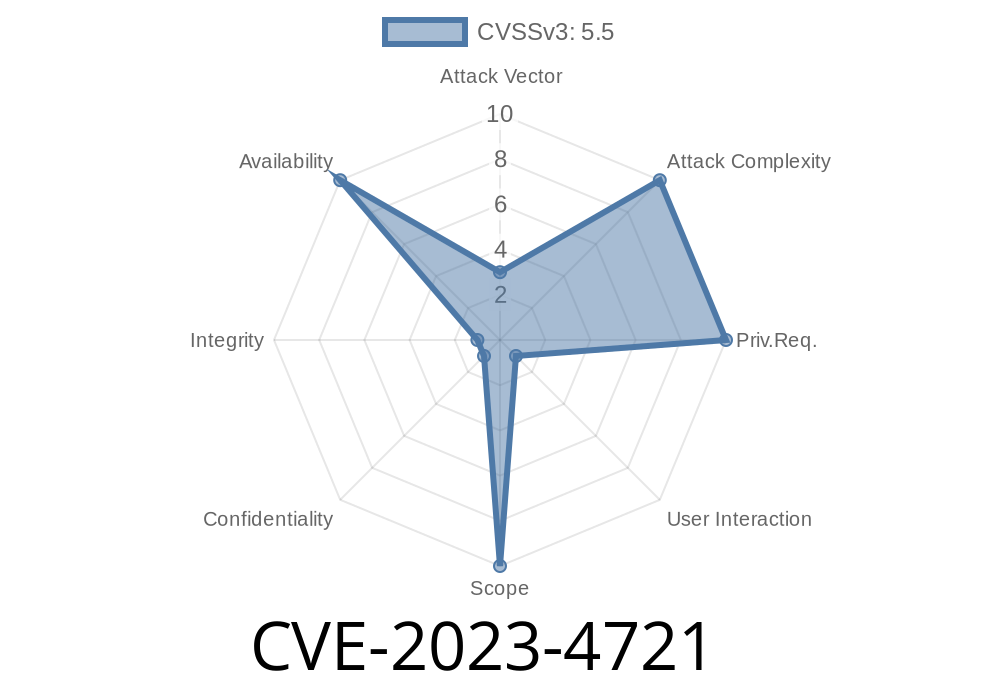Open-source multimedia frameworks fuel countless media applications, and GPAC is one of the big names in media packaging and streaming. Recently, a security issue was discovered in GPAC’s source code (specifically the gpac/gpac repo on GitHub) before the 2.3-DEV release. This vulnerability, assigned CVE-2023-4721, is an Out-of-bounds Read, meaning the software may read data past the end of allocated memory buffers, potentially leaking application data or causing a crash.
In this exclusive long read, we’ll break down the bug, show code snippets, provide references, and explore how it could be exploited—all in plain, simple language.
What is an Out-of-Bounds Read?
This type of bug happens when a program tries to read more information than it’s supposed to from a block of memory. The consequences range from unwanted crashes to unintended data leakage, or even remote code execution in some cases.
The Affected Software: GPAC
GPAC is a multimedia framework for packaging, streaming, and processing media. It’s used in professional and research environments for handling formats like MP4, DASH, and others.
CVE-2023-4721 affects all versions prior to 2.3-DEV.
Technical Details
The issue lies in how certain buffer reads were performed in the codebase. When parsing specially-crafted media files, the parsing function did not properly verify boundaries. This enabled an attacker to trigger an out-of-bounds memory read.
This vulnerability is described in the GitHub security advisory and MITRE's CVE database.
Let’s look at a simplified example based on typical patterns in GPAC parsing code
// Hypothetical vulnerable function
int parse_box(uint8_t* buffer, size_t size) {
uint32_t box_length = *(uint32_t*)buffer; // Reads 4 bytes as box size
// ... other code ...
// POTENTIAL OUT-OF-BOUNDS READ
if (box_length > size) {
printf("Box length too large!\n"); // error, but fix missing!
}
// Later code uses box_length without proper limits:
uint8_t* data = buffer + 4;
for (size_t i = ; i < box_length - 4; i++) {
process_byte(data[i]); // Risk: data[i] may be out-of-bounds if box_length > size
}
return ;
}
What went wrong?
The code attempts to read box_length bytes from a buffer, but if box_length is larger than the actual size of the buffer, the loop continues reading past the end. Though an error is printed, the function goes on regardless.
How Can Attackers Exploit This?
1. Crafted Media Files: Attackers can craft an MP4 or ISOBMFF file where the box_length field is set larger than the buffer.
2. Trigger in GPAC: When GPAC processes this file (using MP4Box tool, or in streaming servers), it reads past buffer limits.
*Crash*: Reading random memory can cause a segmentation fault.
- *Information Leak*: Sensitive information from memory could be leaked (rare, but possible depending on implementation).
Proof-of-Concept (PoC) Example
Below is a minimal (not fully working, for illustration) example of how one might create such a malicious file:
# Create a fake MP4 box with invalid length
with open("evil.mp4", "wb") as f:
f.write(b"\xFF\xFF\xFF\xF") # Very large box length (429496728)
f.write(b"mdat") # Box type 'mdat'
f.write(b"a" * 16) # Some dummy payload
# When processed, GPAC's parser may read beyond buffer limits.
Load this file with a vulnerable version of MP4Box
MP4Box -info evil.mp4
If the parser doesn’t properly validate lengths, this could cause a crash.
Patch and Mitigation
The fix for this bug ensures that buffer limits are correctly checked, and that the parser aborts if fields don’t match buffer size.
Relevant Patch:
Check the pull request/commit for the fix.
References
- GitHub GPAC Advisory for CVE-2023-4721
- MITRE CVE Entry
- Official GPAC Repository
- Patch fixing the vulnerability
Summary
CVE-2023-4721 is a security bug in GPAC (<2.3-DEV) where out-of-bounds reads can be triggered via crafted media files. By upgrading to the latest version and processing only trusted files, you stay safe from this and similar vulnerabilities.
Always keep your media processing tools updated—parsing binary media is hard, and attackers are always searching for the next overlooked bug!
Timeline
Published on: 09/01/2023 16:15:00 UTC
Last modified on: 09/06/2023 00:15:00 UTC
